What does EKL mean in ENGINEERING
Engineering Knowledge Language (EKL) is a formal language designed to represent and share engineering knowledge. It is a computer-interpretable language that enables engineers to capture, organize, and retrieve engineering information in a structured and unambiguous way.

EKL meaning in Engineering in Academic & Science
EKL mostly used in an acronym Engineering in Category Academic & Science that means Engineering Knowledge Language
Shorthand: EKL,
Full Form: Engineering Knowledge Language
For more information of "Engineering Knowledge Language", see the section below.
What is EKL
EKL is a declarative language that describes engineering knowledge in terms of concepts, relationships, and rules. It allows engineers to define engineering entities, their attributes, and the relationships between them. EKL also provides mechanisms for defining constraints, logical expressions, and inference rules.
Benefits of EKL
Using EKL offers several benefits, including:
- Improved knowledge sharing: EKL facilitates the exchange of engineering knowledge between different stakeholders, including engineers, designers, and manufacturers.
- Enhanced collaboration: EKL promotes collaboration by providing a common language for describing and sharing engineering knowledge.
- Reduced errors: EKL's formal structure helps reduce errors by ensuring that knowledge is represented consistently and accurately.
- Increased productivity: EKL can automate knowledge-intensive tasks, such as design verification and configuration management, leading to increased productivity.
Applications of EKL
EKL has various applications in engineering, such as:
- Design automation
- Knowledge management
- Product lifecycle management
- Systems engineering
- Simulation and modeling
Essential Questions and Answers on Engineering Knowledge Language in "SCIENCE»ENGINEERING"
What is Engineering Knowledge Language (EKL)?
EKL is a formal language designed to represent and exchange engineering knowledge, enabling computers to understand and reason about engineering concepts.
What are the benefits of using EKL?
EKL facilitates collaboration, improves accuracy, reduces development time, automates design tasks, and enables knowledge reuse in engineering processes.
How is EKL used in practice?
EKL is used in various applications, including design optimization, product configuration, maintenance planning, and decision support systems.
What are the key features of EKL?
EKL's key features include its formal syntax, modular structure, and ability to represent knowledge at different levels of abstraction.
How is EKL different from other knowledge representation languages?
EKL is specifically tailored to engineering knowledge, providing a structured and domain-specific vocabulary that enhances the accuracy and consistency of knowledge representation.
What is the relationship between EKL and ontology?
EKL builds upon ontologies to define the underlying concepts and relationships in the engineering domain, providing a shared understanding of the knowledge being represented.
Is EKL open source?
Yes, EKL is an open-source language developed by the W3C EKL Working Group.
Where can I learn more about EKL?
Resources for learning about EKL include the W3C EKL Working Group website, research papers, and online tutorials.
Final Words: EKL is a powerful language that enables engineers to effectively represent, share, and reuse engineering knowledge. Its structured and unambiguous nature makes it a valuable tool for enhancing collaboration, improving productivity, and reducing errors in engineering processes.
